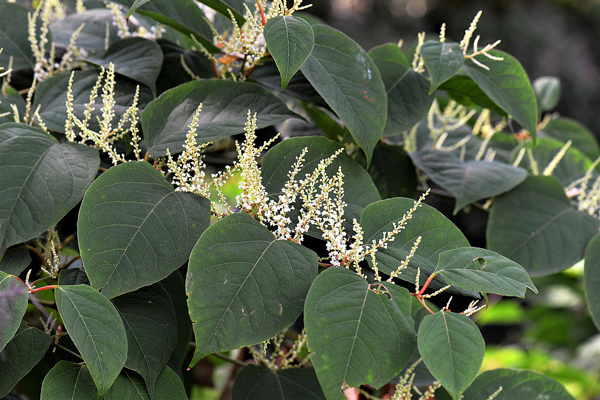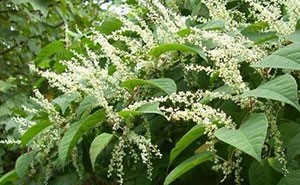Superior service and solutions

When selling or buying a house with Japanese Knotweed, it is essential that you are aware of the law that surrounds it. There are new rules that will shortly be implemented, and it is paramount that you are aware of these very important changes.
Is your property affected by Japanese Knotweed? Will you be able to sell your property? Will you be able to purchase the property down the road from where it is present? What about a mortgage lender? Is the presence of Japanese Knotweed acceptable to them?
Continue reading to answer some of these important questions in Labrums’ guide to Japanese Knotweed.
What is Japanese Knotweed?
Japanese Knotweed is an invasive plant which has acquired a reputation over the years and been blamed for causing damage to properties. It was introduced from Japan in 1850, it reproduces rapidly and can grow up to 10cm in a day.
I want to sell my house and have Japanese Knotweed present, can I leave it?
It is not a crime to have Japanese Knotweed present on your property, but it has been legally classed as a controlled plant under the Wildlife and Countryside Act 1981 section 114 (2) (WCA 1981). Therefore, it is against UK law to cause a nuisance by allowing it to grow onto another property. Failure to control the spread of Japanese Knotweed could result in an anti-social behaviour order as well as a fine up to £2,500.00.
Given how quickly it can grow, it is very important to have a management plan in place if it is present at your property as it would only be a matter of time before it worked its way outside of your boundary. If you are selling to a buyer that will need to obtain a mortgage, it is likely (whether there is a management plan in place or not) that the matter will have to be referred to their lender for approval. Depending on the position, it could be hard for you to sell to a buyer that is obtaining a mortgage and cash buyers may be your only option which means that the pool of available buyers to you will be smaller.

Does Japanese Knotweed stop you from getting a mortgage?
Infestations of Japanese Knotweed can make a mortgage application more difficult. Some lenders have refused to lend where it is present within the boundary of the property or even if it is present within the vicinity of the property. Of course, it is prudent to physically inspect any property you wish to purchase and, in addition, to seek confirmation from a qualified Surveyor that there is not any present.
Some lenders will lend as long as there is an eradication plan in place. Every lender has their own policies, requirements and regulations and your solicitor would need to refer the specific position to your lender to obtain their consent to proceed. There is a 7-metre rule which states that if Japanese Knotweed is found to be growing within 7 metres of the boundary of the property, a mortgage will likely not be offered. The purpose is to protect the lender should the knotweed have any impact on the value of the property.

New changes to the current Japanese Knotweed Law
The Royal Institute of Chartered Surveyors (RICS) have scrapped the 7-metre rule that valuers use when determining whether Japanese Knotweed poses a threat to a property. The RICS guidance note explains the full changes to the Japanese Knotweed law in further detail.
The move comes after a 2019 report by the House of Commons Science and Technology Committee where mortgage lenders as well as MPs advised that the current rules were ‘over cautious’. RICS advised within their guidance note that ‘research has demonstrated, and it is now generally accepted, that Japanese Knotweed poses little or no risk of structural damage to robust buildings with substantial foundations such as dwellings, as opposed to less sturdy structures with shallow foundations, such as conservatories, garages, or boundary walls’.
The body says: “There is also a recognition that the most appropriate objective when Japanese knotweed is encountered is to ensure an appropriate level of control rather than to automatically strive for eradication. In some circumstances, for example when construction is proposed, proper control may involve physical removal but in many domestic situations effective control can be achieved by the managed application of herbicides. As part of normalising expectations in relation to Japanese knotweed, the assessment directs the valuer or surveyor to outcomes related to the management of Japanese knotweed rather than emphasising risk to buildings.”
Further Japanese Knotweed legal advice
As conveyancing solicitors, we are unable to inspect your property. However, when the time comes to buying a property, our expert solicitors will raise the necessary questions if the sellers cannot be sure if Japanese Knotweed is present. Get in touch today for coherent Japanese Knotweed legal advice to help guide you through the process.
Protect yourself – Protect your asset – Protect your future.
















เว็บพนันออนไลน์เกาหลี
November 20, 2024... [Trackback] [...] There you can find 72283 more Information to that Topic: labrums.co.uk/blog/guide-to-japanese-knotweed [...]
live chat
November 20, 2024... [Trackback] [...] Read More here to that Topic: labrums.co.uk/blog/guide-to-japanese-knotweed [...]
ติดเน็ต ais
November 21, 2024... [Trackback] [...] Read More to that Topic: labrums.co.uk/blog/guide-to-japanese-knotweed [...]
สล็อตเกาหลี
November 23, 2024... [Trackback] [...] Info to that Topic: labrums.co.uk/blog/guide-to-japanese-knotweed [...]
pgslot
December 9, 2024... [Trackback] [...] Find More here to that Topic: labrums.co.uk/blog/guide-to-japanese-knotweed [...]
Red Boy Mushroom
December 15, 2024... [Trackback] [...] Read More on to that Topic: labrums.co.uk/blog/guide-to-japanese-knotweed [...]
แนะนำ ฟีเจอร์พิเศษ ภายในเกม lucky neko
December 19, 2024... [Trackback] [...] Find More on to that Topic: labrums.co.uk/blog/guide-to-japanese-knotweed [...]
Movewinbet
December 27, 2024... [Trackback] [...] Find More on to that Topic: labrums.co.uk/blog/guide-to-japanese-knotweed [...]
coupon codes
January 11, 2025... [Trackback] [...] There you will find 44301 additional Information to that Topic: labrums.co.uk/blog/guide-to-japanese-knotweed [...]
Ufasnake
January 25, 2025... [Trackback] [...] Find More Info here on that Topic: labrums.co.uk/blog/guide-to-japanese-knotweed [...]
เค้กวันเกิด
January 25, 2025... [Trackback] [...] Info to that Topic: labrums.co.uk/blog/guide-to-japanese-knotweed [...]
โคมไฟ
February 11, 2025... [Trackback] [...] Read More Info here to that Topic: labrums.co.uk/blog/guide-to-japanese-knotweed [...]
pgslot168
March 8, 2025... [Trackback] [...] Info on that Topic: labrums.co.uk/blog/guide-to-japanese-knotweed [...]
สีทนไฟ
March 15, 2025... [Trackback] [...] Information to that Topic: labrums.co.uk/blog/guide-to-japanese-knotweed [...]
สมัครสล็อตวอเลท ฝากถอนไม่มีขั้นต่ำ เริ่มต้นบาทเดียว
March 16, 2025... [Trackback] [...] Here you will find 85058 more Information to that Topic: labrums.co.uk/blog/guide-to-japanese-knotweed [...]
vox casino
March 18, 2025... [Trackback] [...] Here you can find 12725 more Info to that Topic: labrums.co.uk/blog/guide-to-japanese-knotweed [...]
Mostbet
March 19, 2025... [Trackback] [...] Read More on that Topic: labrums.co.uk/blog/guide-to-japanese-knotweed [...]
mostbet
March 25, 2025... [Trackback] [...] Here you can find 22237 more Information to that Topic: labrums.co.uk/blog/guide-to-japanese-knotweed [...]
ไฟหน้ารถยนต์โปรเจคเตอร์
April 11, 2025... [Trackback] [...] Read More Info here to that Topic: labrums.co.uk/blog/guide-to-japanese-knotweed [...]
ufabet777
April 17, 2025... [Trackback] [...] Read More on on that Topic: labrums.co.uk/blog/guide-to-japanese-knotweed [...]
เว็บปั้มไลค์
April 17, 2025... [Trackback] [...] Read More to that Topic: labrums.co.uk/blog/guide-to-japanese-knotweed [...]
rich89bet
April 21, 2025... [Trackback] [...] Read More to that Topic: labrums.co.uk/blog/guide-to-japanese-knotweed [...]
เช็คสลิปโอนเงิน
May 7, 2025... [Trackback] [...] Find More Info here on that Topic: labrums.co.uk/blog/guide-to-japanese-knotweed [...]
เครื่องเป่าแอลกอฮอล์
May 17, 2025... [Trackback] [...] Info to that Topic: labrums.co.uk/blog/guide-to-japanese-knotweed [...]
โปร lsm99
May 22, 2025... [Trackback] [...] Find More Info here to that Topic: labrums.co.uk/blog/guide-to-japanese-knotweed [...]
pin-up casino website
May 30, 2025... [Trackback] [...] Here you can find 96511 additional Info to that Topic: labrums.co.uk/blog/guide-to-japanese-knotweed [...]
pg168
June 11, 2025... [Trackback] [...] Find More here on that Topic: labrums.co.uk/blog/guide-to-japanese-knotweed [...]
نسخة الويب من واتساب
June 11, 2025... [Trackback] [...] Find More on that Topic: labrums.co.uk/blog/guide-to-japanese-knotweed [...]
เครื่องวัดแอลกอฮอล์
June 17, 2025... [Trackback] [...] Info on that Topic: labrums.co.uk/blog/guide-to-japanese-knotweed [...]
Cali packs
July 1, 2025... [Trackback] [...] Find More Info here to that Topic: labrums.co.uk/blog/guide-to-japanese-knotweed [...]
1xslots
July 1, 2025... [Trackback] [...] Read More to that Topic: labrums.co.uk/blog/guide-to-japanese-knotweed [...]
รับงาน
July 14, 2025... [Trackback] [...] Information on that Topic: labrums.co.uk/blog/guide-to-japanese-knotweed [...]
ตู้ล่าม
July 15, 2025... [Trackback] [...] Find More on on that Topic: labrums.co.uk/blog/guide-to-japanese-knotweed [...]
Pin-Up India review
July 15, 2025... [Trackback] [...] Read More to that Topic: labrums.co.uk/blog/guide-to-japanese-knotweed [...]
essentials
July 19, 2025... [Trackback] [...] Read More Information here to that Topic: labrums.co.uk/blog/guide-to-japanese-knotweed [...]
skrotning av bil Göteborg
July 19, 2025... [Trackback] [...] Info on that Topic: labrums.co.uk/blog/guide-to-japanese-knotweed [...]
BOSTON777 ตอบแชทไวทักได้ตลอด 24 ชั่วโมง
July 28, 2025... [Trackback] [...] Information to that Topic: labrums.co.uk/blog/guide-to-japanese-knotweed [...]
เว็บตรงฝากถอนง่าย
August 10, 2025... [Trackback] [...] Information to that Topic: labrums.co.uk/blog/guide-to-japanese-knotweed [...]
Gioca responsabilmente su Winnita
August 19, 2025... [Trackback] [...] Here you will find 38642 more Information on that Topic: labrums.co.uk/blog/guide-to-japanese-knotweed [...]
LSM99 CASHBACK Credit 3% ทุกวัน
August 22, 2025... [Trackback] [...] Here you can find 70178 additional Info on that Topic: labrums.co.uk/blog/guide-to-japanese-knotweed [...]
vegasnow no deposit bonus codes
September 2, 2025... [Trackback] [...] Information to that Topic: labrums.co.uk/blog/guide-to-japanese-knotweed [...]
เทรดทองคืออะไร
September 7, 2025... [Trackback] [...] Read More on to that Topic: labrums.co.uk/blog/guide-to-japanese-knotweed [...]
Angthong National Marine Park
September 25, 2025... [Trackback] [...] There you can find 23260 additional Info to that Topic: labrums.co.uk/blog/guide-to-japanese-knotweed [...]
เครื่องออกกำลังกายกลางแจ้ง
September 27, 2025... [Trackback] [...] Read More to that Topic: labrums.co.uk/blog/guide-to-japanese-knotweed [...]
vg98
October 9, 2025... [Trackback] [...] There you will find 41669 additional Info to that Topic: labrums.co.uk/blog/guide-to-japanese-knotweed [...]
รับทำเว็บไซต์
October 17, 2025... [Trackback] [...] Find More Info here on that Topic: labrums.co.uk/blog/guide-to-japanese-knotweed [...]
รับงานเอง
October 30, 2025... [Trackback] [...] Find More to that Topic: labrums.co.uk/blog/guide-to-japanese-knotweed [...]
BETFLIX
November 1, 2025... [Trackback] [...] Read More on on that Topic: labrums.co.uk/blog/guide-to-japanese-knotweed [...]
https://kaspikazinootzyvy.kz/
November 5, 2025... [Trackback] [...] Information on that Topic: labrums.co.uk/blog/guide-to-japanese-knotweed [...]
ตรายางออนไลน์
December 3, 2025... [Trackback] [...] Read More here to that Topic: labrums.co.uk/blog/guide-to-japanese-knotweed [...]
HILO789
December 16, 2025... [Trackback] [...] Find More on on that Topic: labrums.co.uk/blog/guide-to-japanese-knotweed [...]
คลินิกทันตกรรม กระบี่
December 28, 2025... [Trackback] [...] Read More Info here to that Topic: labrums.co.uk/blog/guide-to-japanese-knotweed [...]
clothing manufacturer
January 17, 2026... [Trackback] [...] Information on that Topic: labrums.co.uk/blog/guide-to-japanese-knotweed [...]